Owning a dog is a beautiful thing. How can a creature on four legs get so under our skin? For many people, their dog is their family member, and they treat them like one, which is absolutely amazing.
Creating many beautiful memories that will last you a lifetime is something to cherish. But, there are other things that can be concerning and overwhelming. The most common thing that a lot of dog owners need to face is their dog getting sick.
This is something that can truly be alarming for both the dog and the owner. Some health issues can be dangerous while others are not so much and go away quickly.
Some of those problems are coughs. When it comes to coughs, you may ask yourself why my dog sounds like he has a hairball? There can be many answers… one being that your dog actually has a hairball that is making him a bit uncomfortable and he needs to cough from time to time.
We prepared for you all the answers as to why your dog sounds like he has a hairball, what you can do about it, and how a hairball appears in the first place.
My Dog Sounds Like He Has A Hairball: Can A Dog Form A Hairball, Or Just Cats?

We have all heard of cats getting hairballs, but a lot of people do not know that dogs can get one as well. Hairballs in dogs might not be as common as hairballs in cats, but it can for sure happen, and you may ask, ˝How?˝
Dogs, just like cats, groom themselves by licking their body. Their tongue is serrated, and this means that they might have trouble spitting out all of the hair or any debris from their mouth.
This is similar to cats, but they groom themselves regularly so they are used to hair getting in their stomach and forming a hairball. Their stomach will sense it, and after some point, they will eject it and be all fine.
Dogs might have some issues ejecting the hairball from their stomach or throat because their body is not as used to it as cats are.
This is when dog coughing occurs. There are many reasons why dogs can cough, but most of us will immediately come to the question of, “Why does my dog sound like he has a hairball?”
But, before going through the possible reasons of why your dog sounds like he has a hairball, we need to define what causes it to build up in a dog’s body.
How Do Dogs Get Hairballs?
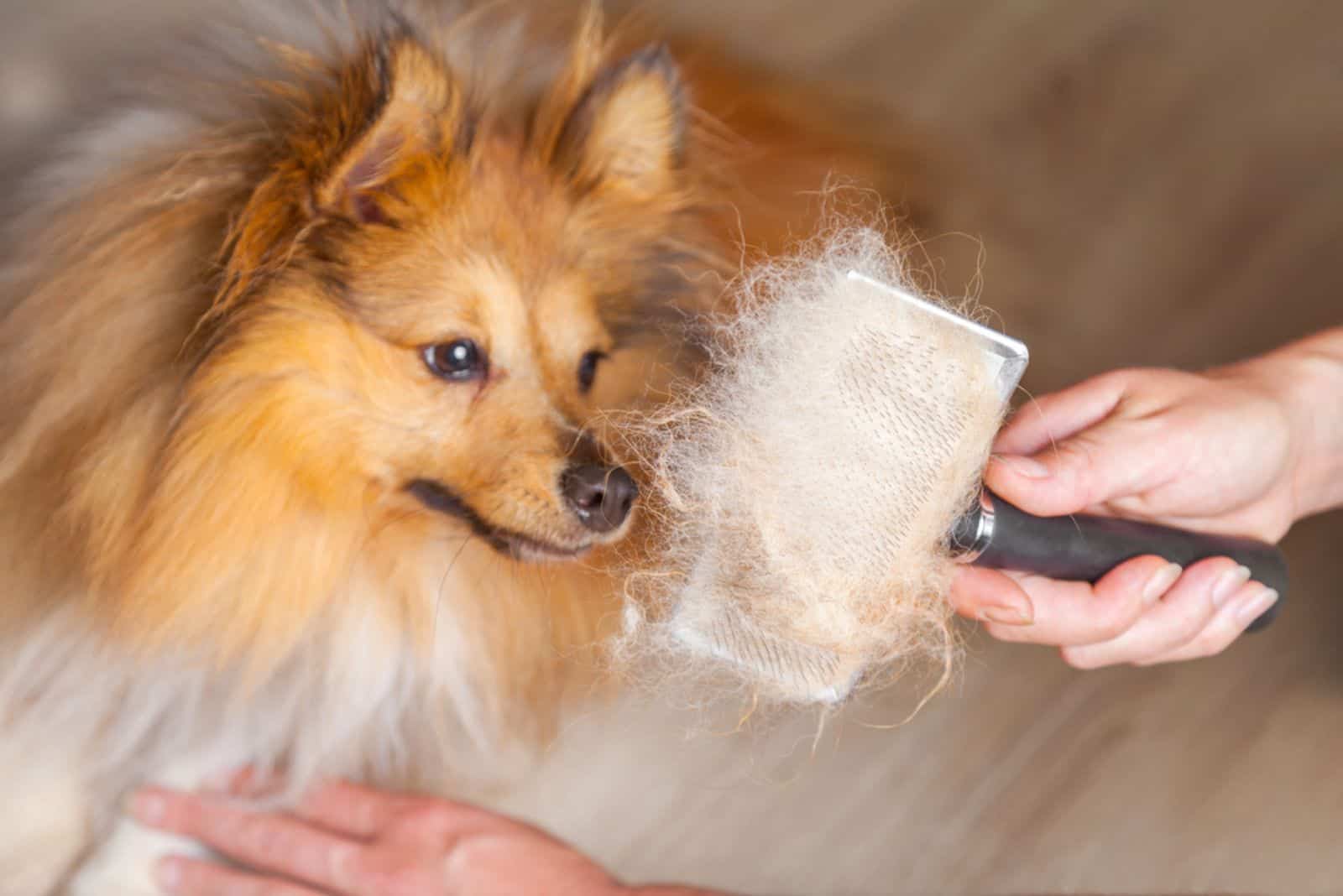
Hairballs are known as a trichobezoar. Don’t worry… we won’t be using this term. It is more for the professionals.
As we have already mentioned, dogs do tend to groom themselves, but not as often as cats do.
Dogs that have a longer coat that sheds heavily will have higher chances of getting a hairball. They will be able to spit out the big hairs that did not attach to the tongue fully, but there will be many small hairs still on their tongue.
The dog, at that point, will not really feel and mind those little hairs, but they will get swallowed as they drink or eat. They can get to their stomach, but they can also gather in their throat, causing a hairball to form.
These things do not look appealing by any means, and you need to be prepared. They do not consist only of hair that can not be digested, but also of some other materials that are either not possible to digest or are hard to digest.
Some of those things are pieces of wood, rocks, or even cardboard. You can also find some food in some of the hairballs because there is always a possibility that some food that is not digested will soon get caught in this mix.
The interesting thing is that dog hairballs often don’t come through their mouth like cats eject theirs, but rather, through their bum. Sometimes, you can clearly notice that your dog’s poop is hanging on a string of hair, and the dog can even get nervous. It is almost like seeing white specks in dog poop. They are very noticeable and so is the hair in it.
Other times, this can go unnoticed because the hairball comes out naturally. The bad thing is that if you notice some hair in your dog’s poop, there is a big chance that there is a hairball somewhere in their stomach that possibly got big enough and became difficult for the dog to eject.
The even bigger issue is that the big hairball can become even bigger if your dog continues to groom itself, and with that, consume even more hair.
What Does A Hairball Cough Sound Like?
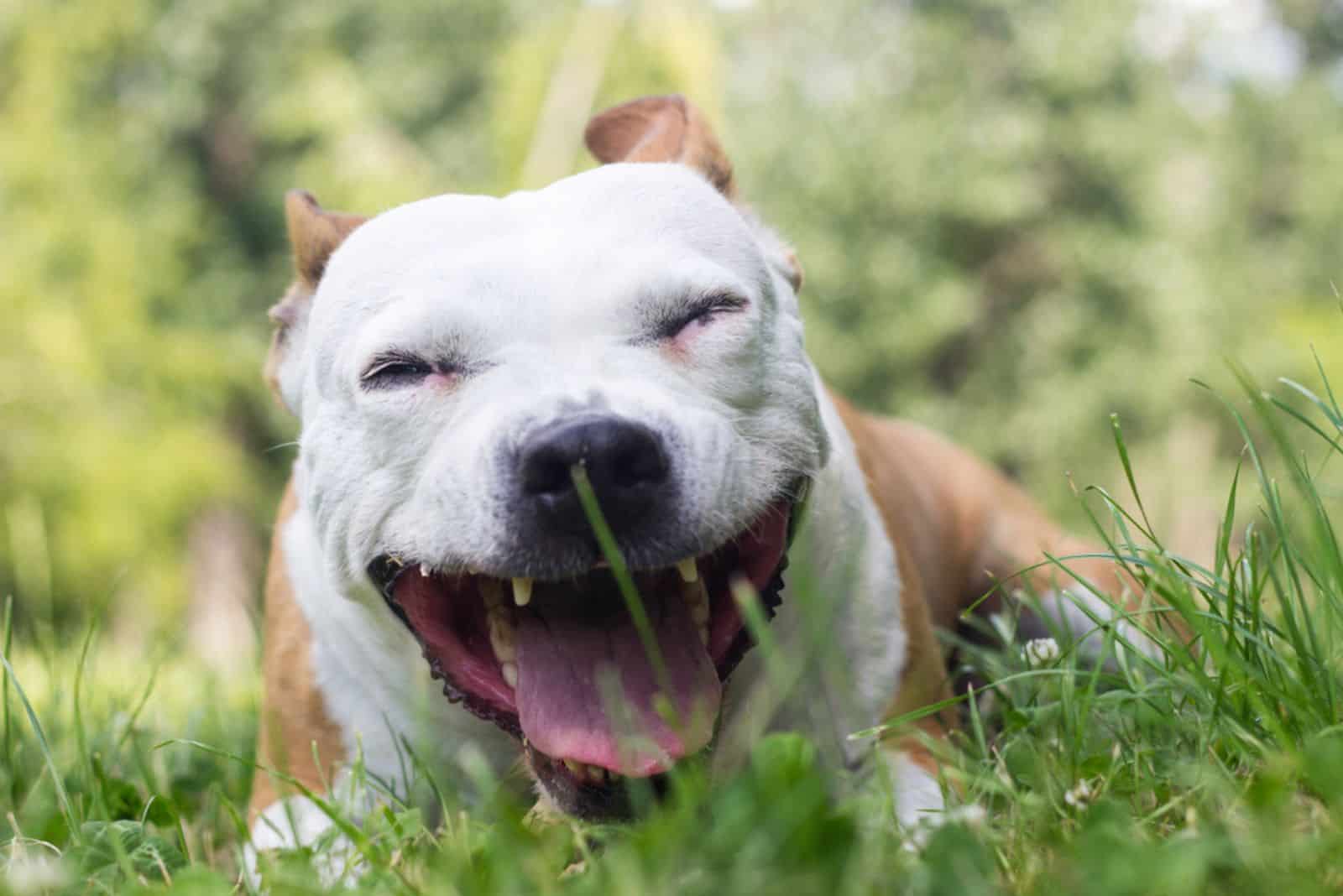
The easiest way to explain your dog coughing because of a hairball is dry. This can be similar to we humans. But, there is usually some twist to it.
The most common thing that occurs before coughing is your dog looking like it is gagging, but not throwing up. It will not be as severe as them gagging because they really need to throw up, but it can sound scary.
After the gagging part, you will see your dog either having a dry cough or sounding like it needs to eject something from its throat.
In this case, the hairball has not gotten into the digestive system far enough for your dog to have the need to cough until it gets out.
The other option is your dog coughing a couple of times a day. This means that the furball might be close to coming out.
Your dog might be coughing and gagging frequently throughout the day. This can mean that your dog is having trouble getting it out of its system. This is the point where you should visit the vet.
But, whatever the stage or the situation might be, if your dog sounds like it has a hairball, but it never comes out, there might be some other serious condition.
Aftermath Of Hairballs In Dogs
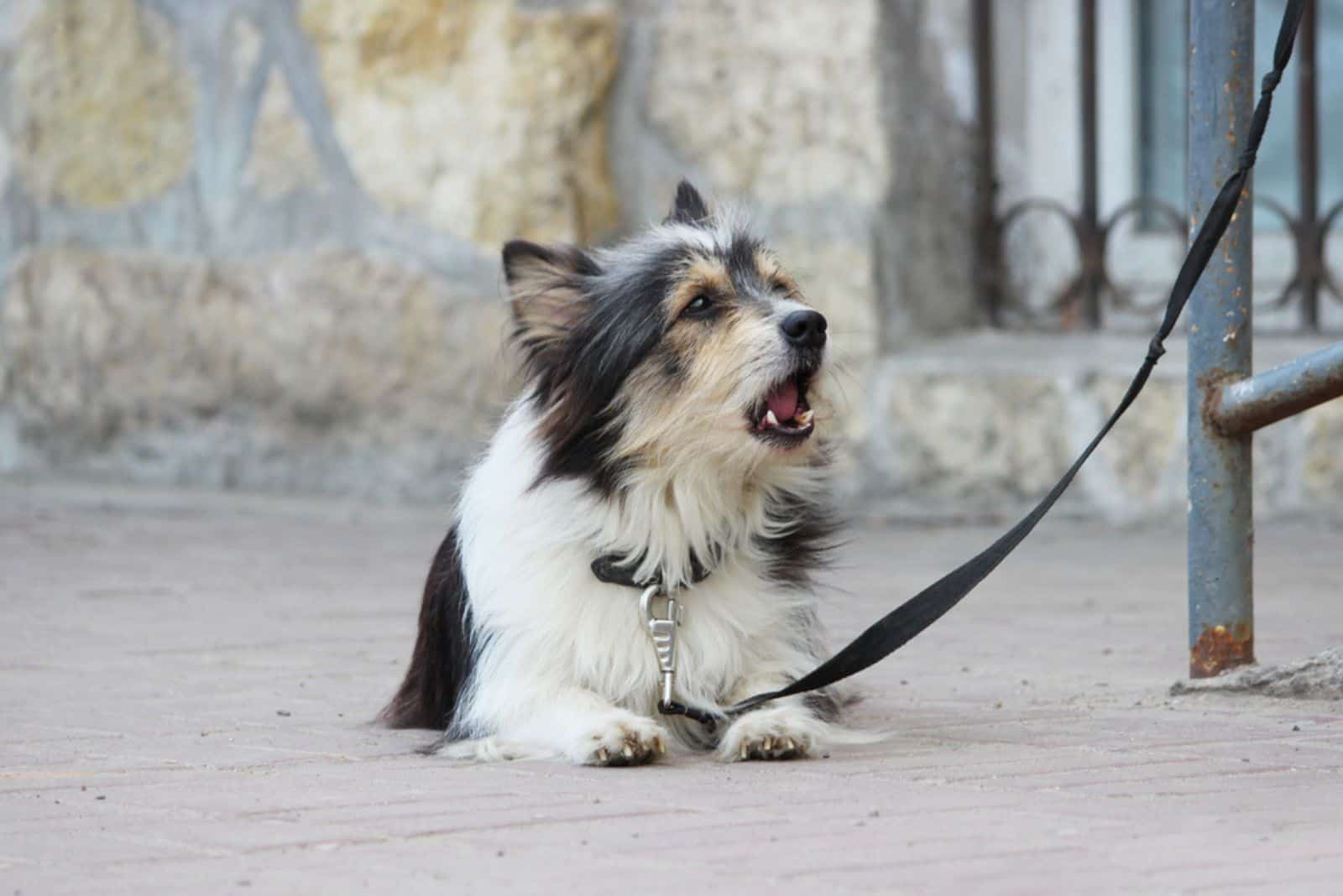
Probably one of the main questions that will pop into your mind is whether or not hairballs are dangerous. The answer is both yes and no. Confusing, right? Don’t worry – we will explain.
If your dog formed a hairball and you see him vomit or cough it out, this is a good thing. After that, your dog will be just fine and have no complications.
But, there is another scenario that can be tricky for multiple reasons. If a dog has a hairball somewhere in its digestive system and it does not eject it, then there can be many problems caused.
The tricky thing is that we as dog owners can never be 100% sure that the dog, indeed, has a hairball. Your dog will, in most cases, present a strange behavior that we are sure you will catch, and then take him or her to the vet.
Some strange behavior will not only be connected with their physical symptoms, but with their mental symptoms as well. They might get attached to you all of a sudden, and you need to keep an eye on that as well.
The main and the most dangerous thing is that the ball full of hairs will never stay just one size. It will grow as the dog consumes more hairs or materials that are hard to digest. As the hairball gets bigger, the problems will get bigger and more dangerous.
Two things that will happen are either your dog having serious vomiting and diarrhea or getting constipated. This depends on your dog’s immune system and the size of the ball.
Dehydration is also something that is very dangerous in this case, or in any other case as well. There are some warning signs that may help you notice that your dog might be dehydrated.
We need to tell you that some of these signs can be connected to many other health issues, and that if you mix them with something else, we can completely understand why. But, whatever the cause might be, if you notice any of these signs, you should immediately take your dog to the vet.
Here are some of the signs that will show you that your dog is dehydrated:
– Vomiting
– Dry nose
– Low energy levels
– Diarrhea
– Dry eyes
– Panting
– Dry gums
– Sticky gums
– Loss of appetite
– Constipation because of the blockage in the digestive system
– Hot head
When you take your dog to the vet because of any of these signs, it is important not to forget to mention that your dog is coughing as well. This will help the vet to detect the problem sooner and start the treatment sooner.
What Should You Do If Your Dog Has A Hairball?
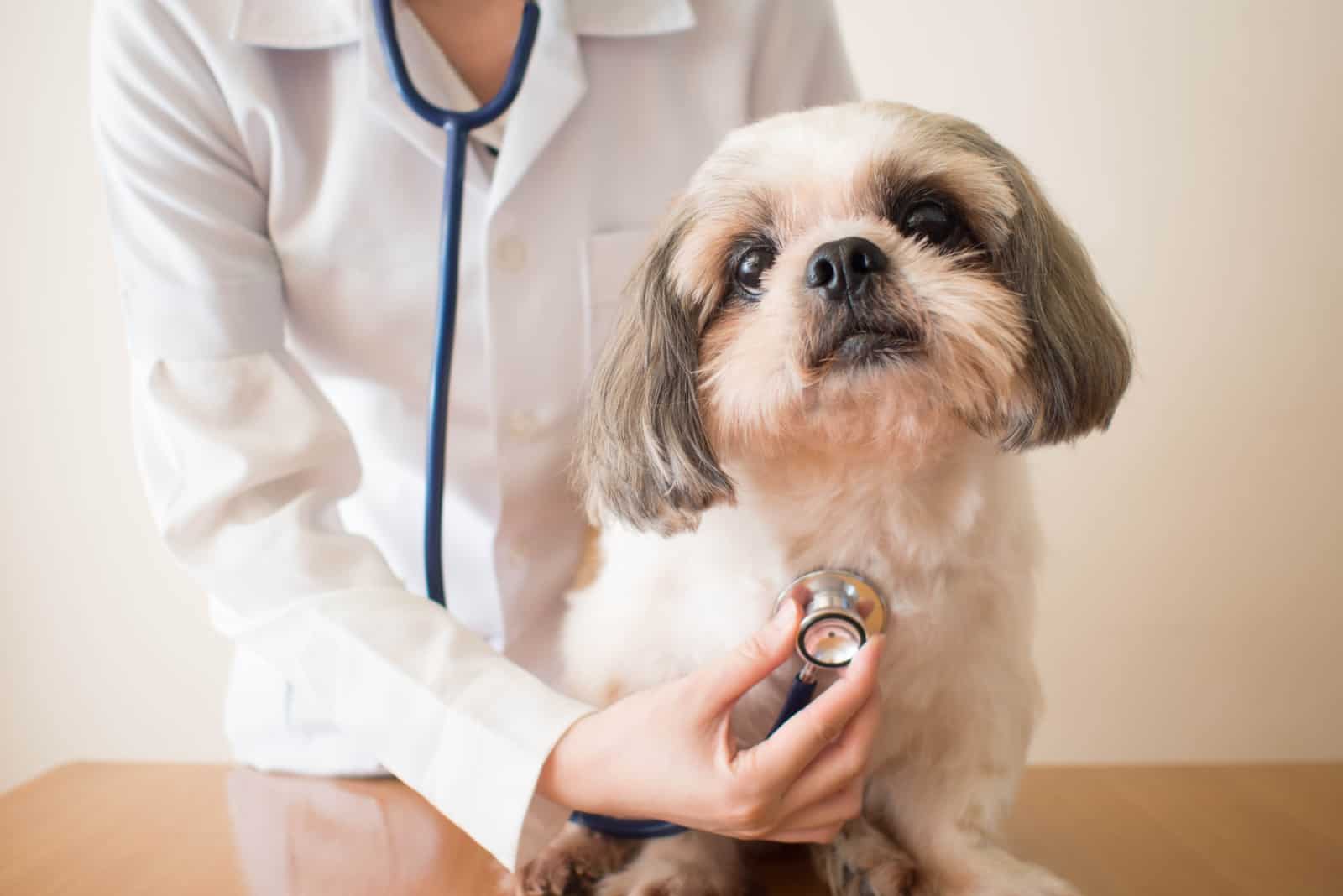
The most obvious thing that you can do when your dog has a hairball, or any other issue, is to take it to the vet. Some health issues do not require a visit to the vet while others can not be solved without one.
As we mentioned, if you see your dog spitting or vomiting out a hairball, then you can sleep well. This dog will have no further problems. Dogs that do not spit them out are the ones that can have serious problems.
Most of the time, you might not even be able to know that your dog in fact has a hairball somewhere in its digestive system. It can also be hard for the vet to detect it. Your dog having irritated skin, fleas, vomiting, etc. is something that the vet can detect easily and start treatment.
A hairball is another story. If your dog is having coughs that sound like it has something stuck in its throat, then there might be a chance for the vet to detect the problem easily. This is the reason why you play an important part.
You need to observe your dog and remember everything that you notice that might seem like your dog is acting strange. Every single detail might bring your vet a step closer to figuring out what is wrong with your pooch.
The vet might give you some laxatives to help your dog solve this problem without getting overwhelmed. You will need to make sure to give them to the dog as the vet suggested.
The main thing you can do is prevent this from happening. You know the saying: It is better to prevent it than to cure it later on.
In the next part, you will be able to read what you can do to prevent all of this from happening.
5 Ways To Prevent Hairballs From Forming
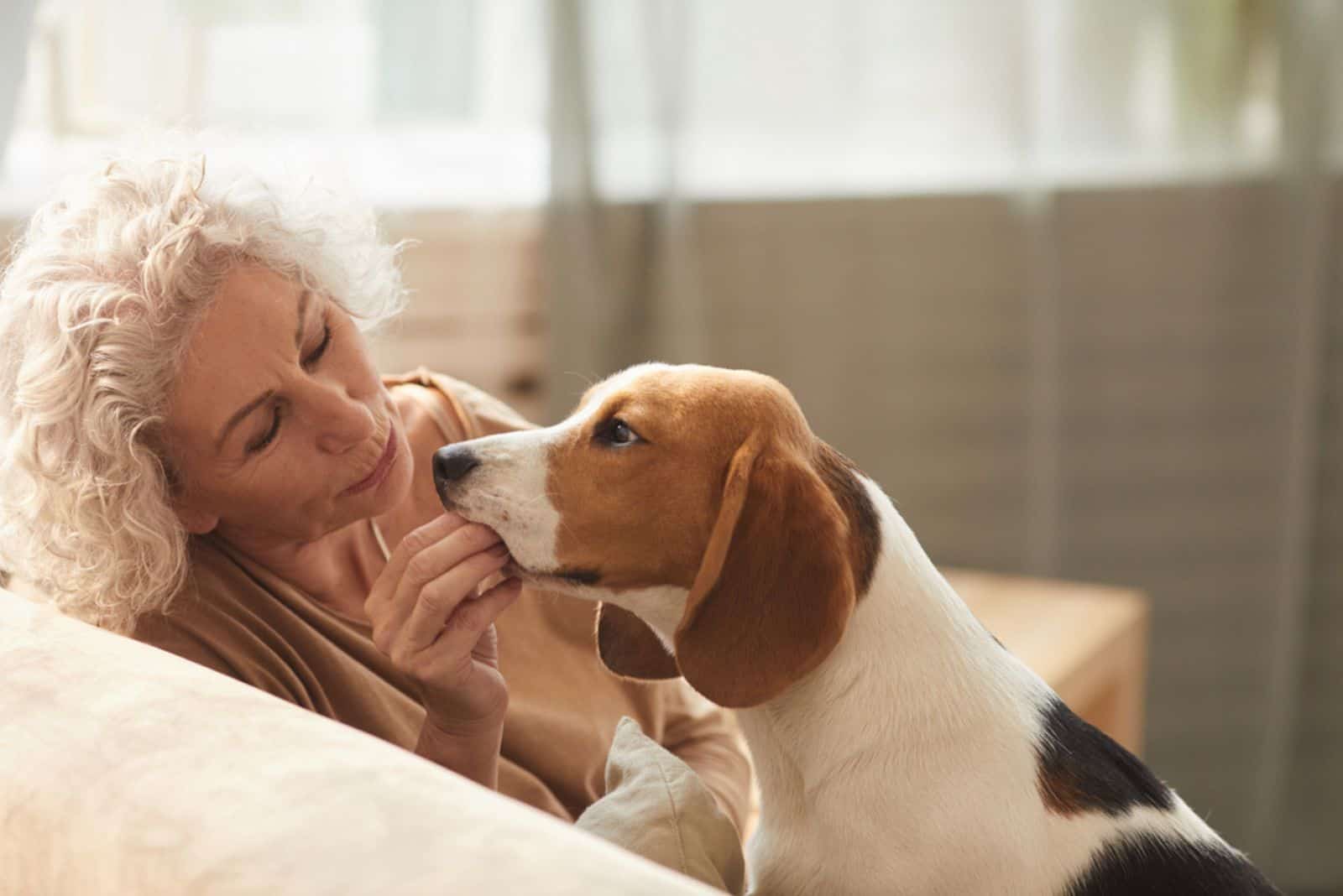
As already mentioned, dog hairballs are a lot rarer than cat hairballs. But, this does not mean that they are impossible to form. Some dogs will go through their whole life without ever forming a hairball, while others might form one and eject it easily.
But, there are cases where this can cause a big problem.
We do not want to scare you or make you feel overwhelmed, but there are always some things that you can do. The good news is that most of these things are the things that most dog owners do on a daily basis or generally keep an eye on.
Before we make a list of the things that you can do to prevent hairballs from developing in your dog’s system, we need to tell you that it is never your fault.
You might be doing everything right and in your power to prevent this thing from happening, but it can still happen in the end.
Here are some of the things that you can do to prevent a hairball from forming:
– Brush your dog regularly. This might help a lot, and this is something that many dog owners do on a daily basis, especially the ones that have dogs that shed a lot. By regularly brushing your dog, you will be the one who removes most of the loose hair, and with that, you are preventing hair from getting into your dog’s stomach.
– Treat your dog for ticks and fleas. This does not mean that fleas and ticks can directly cause hairballs to form, obviously. When your dog has fleas or ticks, he will be itchy and there will be a higher chance for your dog to lick himself often to reduce the itching. This will, in the end, cause your dog to swallow a lot of hair and develop a ball full of hair.
– Fixing the dog’s diet. Giving your dog food that has a lot of fiber will help its digestive system to work better. This way, they will be able to eject the hairball easier. Bad dog food can generally cause gastrointestinal distress, and because of that, dogs will have a lot of trouble ejecting the ball.
– Keep your dog hydrated. This is something that also contributes to their bowel movement improving. There is a bigger chance for the hairball to get ejected naturally without causing any problems for the dog.
– You need to keep your dog entertained. A lot of dogs tend to get a bit destructive if they are bored. The dog might nibble on you, bite furniture, start eating things like underwear, etc. just to show you that it is bored. This way, it consumes a lot of things that are not digestible, which can form into a ball that might cause it a lot of problems.
Are Some Dog Breeds More Prone To Developing Hairballs Than Others?
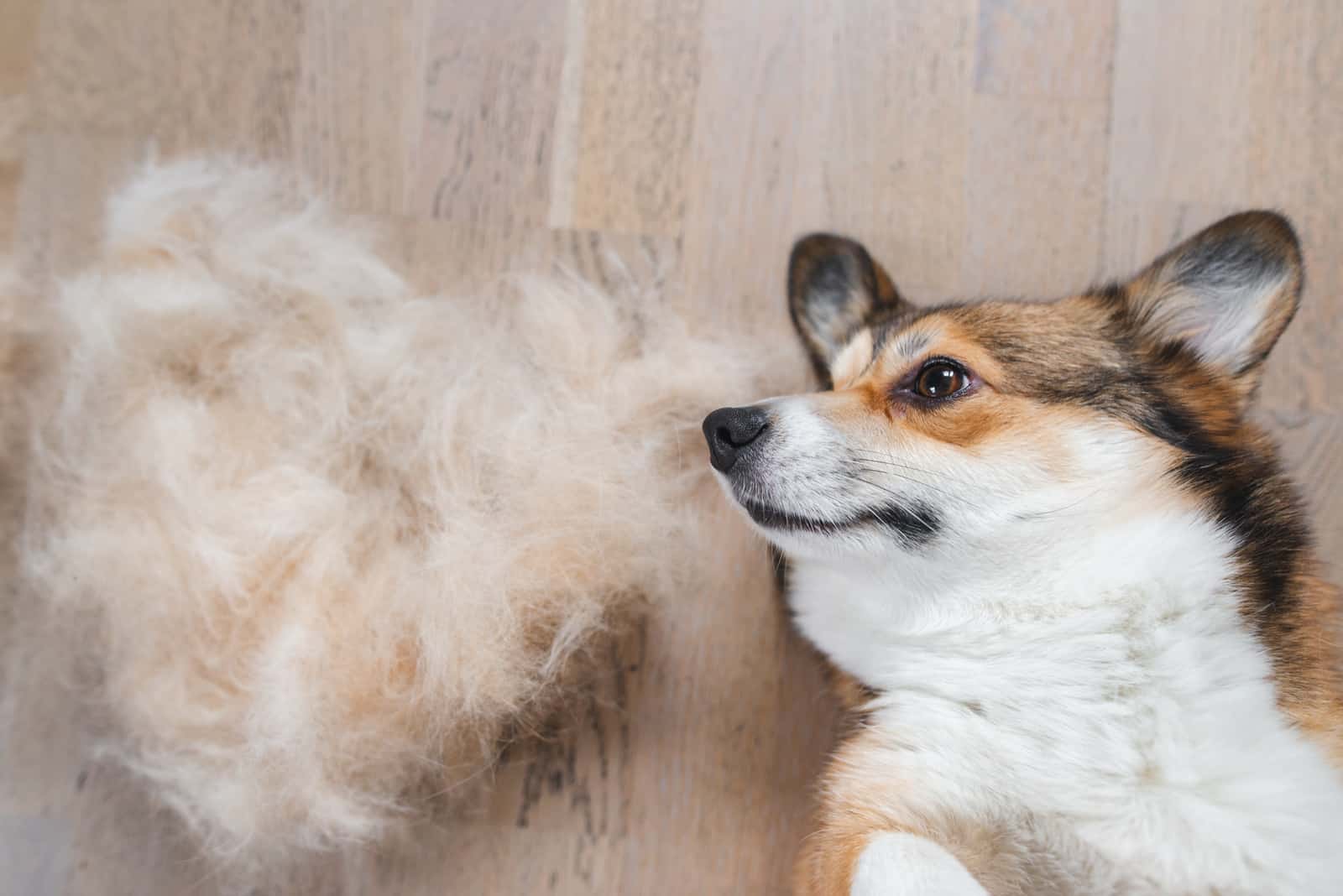
When it comes to the development of hairballs, you need to know that it has nothing to do with dog breeds. This might sound strange and shocking, but hair length has nothing to do with forming hairballs as well.
This might not sound logical when you think about it. A lot of people might think that dogs that have a long coat and shed a lot will for sure get at least one hairball in their lifetime, but that is not true.
The main thing that is important when it comes to the development and ejection of balls full of hair is the digestive system and bowel movement. Dogs that have problems with digestive tract movement will have problems with hairballs.
They will not be able to eject the ball naturally, and that can cause a lot more problems because the ball will only get bigger and bigger.
Dogs that have problems with fleas, skin conditions, allergies, mites, etc. will also be more prone to developing this problem.
If there are some dog breeds that are more prone to, for example, skin problems, they might have a higher chance of forming hairballs, but that is not proven to be true 100%, so it can not be said that some dog breeds will for sure be prone to this problem.
My Dog Sounds Like He Has A Hairball! Potential Causes Besides A Hairball
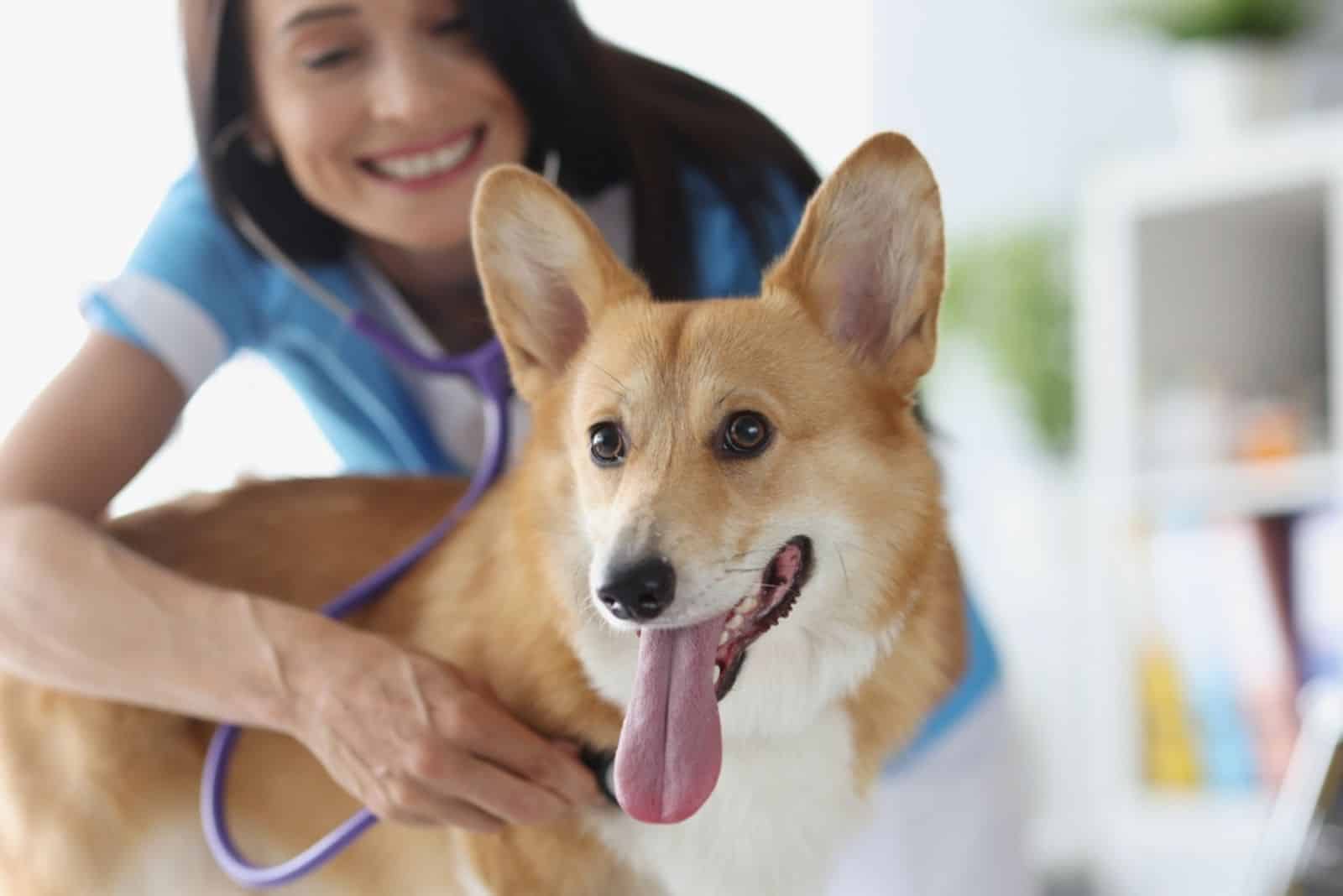
Your dog gagging and coughing like it has something in its throat usually means that there is something that it wants to eject from its body, including a hairball. You need to know that there can also be other potential causes of your dog sounding like it has a hairball.
Some causes, or in other words, health issues can be quite dangerous for the dog, but others are easier to treat.
Here is a list of potential health problems that can be causing your dog to sound like it has a hairball:
– Kennel Cough (or Canine Infectious Respiratory Disease Complex or Bordetella bronchiseptica). This is an infection of the respiratory tract, and it is highly contagious. It can cause many problems for your dog, including a sore throat, which makes your dog suffer from a lot of pain.
Unfortunately, this comes with coughs that sound like your dog has a hairball, and in a lot of cases, it is the cause of those coughs and not the hairball.
But, we are sure that you will notice that something is off with your dog, and that you will take it to the vet on time to prevent anything really bad from happening. Your pooch might be given some cough suppressants to help ease the pain and the coughing.
– Heart disease. If you notice your pooch having a strange cough while it is sleeping, playing, or generally doing anything, you can connect it with some heart issues. These coughs are mostly consistent, and they happen every day until the problem is solved.
Some other symptoms that you need to keep an eye on are a tinted tongue, weakness, lack of appetite, and trouble breathing.
– Pneumonia. Bacterial infections that have not been treated can develop into pneumonia. The two most noticeable symptoms of this health issue are your dog having breathing problems, and coughing strangely. Some other symptoms are fatigue, fever, and panting.
– Collapsing trachea. Tracheal collapse can be described as chronic coughing as it is mostly connected to small dog breeds. A lot of things can cause this health issue, and some of those causes are obesity, heat, and your dog being overly exercised.
– Allergies. If your dog has allergies to dust, some food ingredients, or anything else, they will probably be coughing, sneezing, or have a runny nose and watery eyes. This is nothing to be worried about, and it will not cause your dog to have any other dangerous symptoms like fever, lethargy, vomiting, etc. It can be hard sometimes to detect what your dog is allergic to, but it will not harm your dog.
– Chronic bronchitis. This is a respiratory infection, and to be more precise, it is an infection and inflammation of the airway and windpipe. This causes the production of mucus, and it can cause the dog to have a cough like it has a hairball. It can be easily cured, and in most cases, it is not dangerous for the dog, but it can cause them some discomfort.
– Reverse sneezing. This is something that mostly happens with small dog breeds, especially when they get excited. They will breathe in too much air, and end up with a hacking cough, which will have a hairball sound sometimes. A persistent cough is not usually connected with reverse sneezing.
– Cancer. This is the deadliest reason for your dog to cough. It can start out mild, but it can progress and become very heavy. Unfortunately, something like lung cancer is extremely difficult to cure, especially if it is detected in the later stages.
– Simple cold. This is something that will not affect your dog in a serious way, but if left untreated, it can have an impact on your dog’s health. Parainfluenza virus is the cause of a simple cold. The symptoms are similar to the flu symptoms we humans experience such as honking coughing, sneezing, runny nose, etc. Other common causes can be cold weather and your dog sleeping in a cold room.
– Parasite infection. This infection is in the dog’s intestine where the larvas can come all the way to the lungs. It can turn into a viral infection easily if it is left untreated for a long time. Your dog will be gagging, coughing, and even throwing up and having worms in its poop. The dog can easily catch these parasites in a dog park.
– Obesity. This can cause your dog to have problems with breathing, and even cough severely. You can easily detect an obese dog, and you need to step in and take every measure for your dog to lose weight.
There are some home remedies that you can use to help your dog eject a hairball easier, and make your dog more comfortable. Some of those remedies are:
– Coconut oil
– Steam inhalation
– Honey
– Vitamins
– A lot of water
– Chicken soup
To Sum It All Up

Your dog having any type of health issue is something that can take a toll on a person. The dog can not talk and can not communicate what exactly the problem is. There are many health issues that can be very dangerous and fatal for a dog, like canine adenovirus, cancer, etc.
As we saw, dog coughing can be caused by many things. Besides a hairball, kennel cough is something that produces a cough that sounds exactly like your dog having a hairball in its throat.
Some cases of kennel cough can be very serious, and can cause your dog to have many problems, which is a reason for taking your dog to the vet as soon as you hear it coughing.
You need to remember every detail that you notice with your dog when it showcases some unusual behavior. This can help the vet determine what the issue might be faster. When it comes to hairballs, the vet will most likely use an x-ray to see if there is anything in the dog that should not be there.
There are also some things you can do that can prevent this from happening like brushing your dog regularly, giving them enough water, and preventing “dog chews” as we like to call them, meaning that when a dog has a need to chew on something, you give them a proper toy.
We hope that we gave you all the answers you need when it comes to the question of why my dog sounds like he has a hairball.
Read Next: Do Dogs Have An Adam’s Apple Or Is This Just A Myth?
